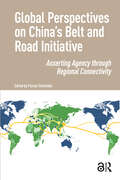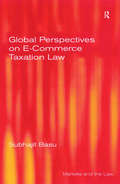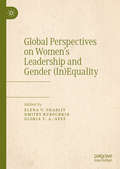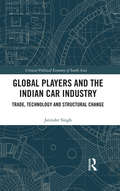- Table View
- List View
Global Perspectives on AI, Ethics, and Business Economics: Charting the Future (Contributions to Management Science)
by José Ramón SauraThis book offers an in-depth exploration of the complex and rapidly evolving world of artificial intelligence (AI), focusing on its ethical, economic, and business dimensions. It provides a comprehensive analysis that intertwines historical context, philosophical ethics, global economic impacts, regulatory landscapes, workforce dynamics, corporate governance, consumer behavior, data ethics, and the use of AI for the good of society. After reviewing the evolution of AI, it offers insights into its historical milestones and the trajectory it may take in the future. This sets the stage for a broader discussion on how AI is not just a technological phenomenon but also a catalyst for ethical, economic, and societal transformation. The book emphasizes the importance of understanding AI&’s historical development in order to gauge its potential impacts on our future. It examines various ethical theories, including utilitarianism, deontology, and virtue ethics, and their application in the realm of AI. Moreover, it explores how AI is reshaping industries, shifting market dynamics, and transforming the global economic landscape.
Global Perspectives on China's Belt and Road Initiative: Asserting Agency through Regional Connectivity
by Florian SchneiderThe year 2013 saw the launch of the largest, most influential investment initiative in recent memory: China's Belt and Road Initiative (BRI). This globe-spanning strategy has reshaped local economies and regional networks, and it has become a contested subject for scholars and practitioners alike. How should we make sense of the complex interactions that the BRI has enabled? Understanding these processes requires truly global perspectives alongside careful attention to the role that local actors play in giving shape to individual BRI projects. The contributions in Global Perspectives on China's Belt and Road Initiative: Asserting Agency through Regional Connectivity provide both 'big picture' assessments of China's role in regional and global interactions and detailed case studies that home in on the role agency plays in BRI dynamics. Written by leading area studies scholars with diverse disciplinary expertise, this book reveals how Chinese efforts to recalibrate the world are taken up, challenged, revamped, and reworked in diverse contexts around the world.
Global Perspectives on Climate Change, Inequality, and Multinational Corporations (CSR, Sustainability, Ethics & Governance)
by João Bento Miguel M. TorresComprising a collection of selected research papers, this book discusses the challenges related to climate change mitigation and adaptation. It adds valuable insights into the link between climate change, global inequality, and multinational corporations. Bringing together an international range of prominent authors, this book interests academics, students, and practitioners. It serves as a valuable guide for policymakers in environmental sustainability. This book encourages researchers to think more broadly about the implications of multinational corporations concerning global inequality and climate change. It deepens understanding of how foreign direct investments can contribute to a more sustainable future and overcome environmental challenges.
Global Perspectives on Corporate Governance and CSR (Corporate Social Responsibility)
by Güler ArasGood governance is good PR, it is important in every sphere of society, whether it be the corporate environment, the political, or wider society. When resources are too limited to meet the minimum expectations of the people, it is a good governance level that can help to promote the welfare of society. Enlightened companies recognise that there is a clear link between governance and corporate social responsibility and make efforts to link the two. Unfortunately this is too often no more than making a claim that good governance is a part of their CSR policy as well as a part of their relationship with shareholders. Corporate Governance and CSR are significant issues in all parts of the world, huge amounts of time and energy are devoted to its global interpretation. Most analysis however is too simplistic to be helpful as it normally resolves itself into simple dualities: rules based v principles based or Anglo-Saxon v Continental. The editors of this book argue that this is not helpful - that the reality is far more complex. They show that Corporate Governance and CSR cannot be understood without taking geographical, cultural and historical factors into account. It is necessary, they say to understand the concerns of people in different parts of the world. Therefore, by using a wealth of case studies, theoretical models, and drawing on the knowledge and perspective of experts from around the world, the editors have produced this valuable book. Global Perspectives on Corporate Governance and CSR discusses issues such as regional and cultural similarities and differences, the contexts of differing legal frameworks and governance codes, differences between large companies and SMEs, governance in new environments (companies and economies) versus stable environments, and the changing environment affecting corporate social responsibility around the world. The editors then synthesise this in a way that will be helpful to business people as well as to academics.
Global Perspectives on E-Commerce Taxation Law (Markets And The Law Ser.)
by Subhajit BasuIn its most advanced form, e-commerce allows unidentified purchasers to pay obscure vendors in 'electronic cash' for products that are often goods, services and licenses all rolled into one. This book considers the implications for the domestic and international tax systems of the growth of e-commerce. It covers a wide variety of activities, from discussion of the principles governing direct and indirect taxation, to explanation of the implementation and use of e-commerce on the part of businesses as well as the application of existing tax principles in this field. With its focus on the broader issues surrounding the expansion of e-commerce and its attention to the problems arising internationally in this field, Global Perspectives in E-Commerce Taxation Law will appeal to scholars worldwide.
Global Perspectives on Green HRM: Highlighting Practices Across the World
by Chima Mordi Hakeem Adeniyi Ajonbadi Olatunji David AdekoyaEnvironmental sustainability has become increasingly important because of irreversible climate change, widespread environmental pollution, and dwindling resource availability over time. Organisations have recently come under more pressure due to increasing economic, political, and societal concerns to address environmental issues and improve their environmental performance. Recently, green human resource management (Green HRM), among other sustainable environmental strategies adopted by organisations, has gained popularity, yet little has been published on green HRM practices across the globe.This book develops our understanding and practice of green HRM across the globe, highlighting practices across different countries on different continents, with a particular focus on the Global South. The authors draw on various types of research (conceptual, theoretical and empirical) and incorporate contextual issues such as technology, politics, culture, and economics to supplement the readers’ insights into the current state of green HRM practices across the globe. By highlighting theoretical underpinnings and emphasising the practical relevance of green HRM practices, this book offers an insightful guide for scholars and students of HRM, as well as HR professionals looking for an academic insight to this vitally important area.
Global Perspectives on Higher Education: Insights From Key Global Publications (Global Perspectives On Higher Education Ser. #36)
by Philip G. AltbachThe single best book on higher education as a global phenomenon.Over the past half-century, globalization has had a profound impact on postsecondary education. The twin forces of mass higher education and the global knowledge economy have driven an unprecedented transformation. These fundamental changes have pulled in opposite directions: one pushes for wider access and accompanying challenges of quality, the other toward exclusive, "world class" research-oriented universities. In Global Perspectives on Higher Education, renowned higher education scholar Philip G. Altbach offers a wide-ranging perspective on the implications of these key forces and explores how they influence academe everywhere. Altbach begins with a discussion of the global trends that increasingly affect higher education, including the implications of mass enrollments, the logic of mass higher education systems around the world, and specific challenges facing Brazil, Russia, India, and China. He considers the numerous implications of globalization, including the worldwide use of the English language, university cross-border initiatives, the role of research universities in developing countries, the impact of the West on Asian universities, and the expansion of private higher education.Provocative and wide-ranging, Global Perspectives on Higher Education considers how the international exchange of ideas, students, and scholars has fundamentally altered higher education.
Global Perspectives on Indian Spirituality and Management: The Legacy of S.K. Chakraborty
by László Zsolnai Sanjoy MukherjeeThis book brings together a collection of articles from eminent scholars and practitioners from India, Europe, the USA, and Australia and investigates the applicability of spiritually inspired business models in Indian and Western contexts. This book is a tribute to the revered Indian management scholar and philosopher Professor S. K. Chakraborty, a pioneer of human values and Indian ethos in management. It explores the potentials and pitfalls of spiritual-based leadership and provides directions for renewing business education to embrace human values and spirituality. The forty contributions in the book are divided into seven sections—introduction; business ethics and management; developing new organizational models and processes; potentials and pitfalls of spirituality-based leadership; leaders and their world; education, spirituality, and society; ways to go—to bring out different aspects of the spirituality in business model endorsed by Chakraborty. The book is a treasure trove for researchers of not only business ethics, but also of leadership and strategy studies, in addition to the organization professionals and the general reader for expert insights on the topic.
Global Perspectives on Insurance Today
by Charles Yang Cecelia Kempler Michel Flamée Paul WindelsThe book's contributors offer their unique perspectives on challenges confronting the insurance industry and how attendant risks can be most effectively managed.
Global Perspectives on Job Insecurity in Higher Education: Precarity in the Ivory Tower (Aligning Perspectives on Health, Safety and Well-Being)
by Sebastiaan Rothmann Hans De Witte Lara Christina RollThis compelling book delves into the damaging effects of job insecurity in higher education across ten countries, shedding light on its profound implications for individuals and institutions. By exploring the associations between job insecurity and critical factors such as health, well-being, and performance, it underscores the urgent need for effective intervention measures. The book also highlights the ripple effects of job insecurity on academic staff, researchers, PhD and postdoctoral students as well as administrative and support staff, ultimately impacting the quality of education. Featuring the largest cross-country data collection on this topic to date, this collaborative effort brings together leading international researchers to provide novel insights. Each chapter offers unique comparative analyses, making the book a vital resource for academics, policymakers, students, and readers worldwide who are invested in the future of higher education. It is both a call to action and a foundation for further research in this critical area.
Global Perspectives on Legal Challenges Posed by Ridesharing Companies: A Case Study of Uber
by Zeynep Ayata Işık ÖnayThis book examines how regulators and policymakers from nine different countries have dealt with Uber, and initiates a legal dialogue between different jurisdictions that could potentially pave the way to a harmonized approach in regulating Uber. The case studies, conducted in Brazil, Germany, Italy, Mexico, Spain, South Africa, Turkey, the UK and the US reveal the case law and regulatory responses that have been adopted in various areas of law. Legal issues relevant to Uber include market regulation, labor law, civil liability, consumer protection, unfair competition and antitrust law. The book thus compares and contrasts the regulatory policy implications of the disruptive innovation created by Uber in the area of transport services. The book starts with a conceptual overview of the legal challenges posed by Uber and concludes with comparative findings based on the individual case studies. In addition to introducing academics and legal practitioners to the theoretical and practical legal problems they may encounter in connection with Uber, the book will especially appeal to policymakers, who can benefit from and compare the experiences of other jurisdictions.
Global Perspectives on Migration and Development: GFMD Puerto Vallarta and Beyond
by Irena OmelaniukThis volume is the first in a new Springer series to examine one of humanity's most pressing concerns: global migration and its implications for development. As population mobility grows in an ever more crowded world, the Global Forum on Migration and Development (GFMD) has emerged as the most important global mechanism to deal with the urgent challenges it presents. This book explores fresh strategies proposed by the GFMD in its fourth year of operation in Mexico and beyond. Interrogating the relationship between migration and development, the papers advance the Global Forum's aims of reducing poverty and empowering low-income families everywhere. In 2010, there were 214 million international migrants worldwide, nearly two and a half times the number in 1965. By 2050, international migration is likely to expand sharply in scale, reach and complexity, due to growing demographic disparities, environmental change, shifting global political and economic dynamics, technological innovations and social networks. Migration can bring substantial gains to families in less-developed countries, and mobile labor is an axiomatic feature of the global economy. Yet outward migration of skilled workers can seriously retard development at home, and exert pressure on wages in host nations. Balancing these and other conflicting concerns requires the substantive and expert discourse offered in this book. Contributors discuss, and propose concrete solutions to, vital issues such as the debilitating costs of cross-border labor recruitment and the provision of social and income protection for foreign contract workers. With suggestions on how to facilitate connections between transnational families, and gender- and family-sensitive immigration regimes, this book aims to foster collaborative intergovernmental links as well as partnerships between governments, civil society and international organizations. It shows how the GFMD can positively influence policy and institutional behavior while addressing wider systemic factors in protecting mobile workers.
Global Perspectives on NGO Communication for Social Change (Routledge Research in Communication Studies)
by Giuliana SorceThis book examines the central role media and communication play in the activities of Non-Governmental Organizations (NGOs) around the globe, how NGOs communicate with key publics, engage stakeholders, target political actors, enable input from civil society, and create participatory opportunities. An international line-up of authors first discuss communication practices, strategies, and media uses by NGOs, providing insights into the specifics of NGO programs for social change goals and reveal particular sets of tactics NGOs commonly employ. The book then presents a set of case studies of NGO organizing from all over the world—ranging from Sudan via Brazil to China – to illustrate the particular contexts that make NGO advocacy necessary, while also highlighting successful initiatives to illuminate the important spaces NGOs occupy in civil society. This comprehensive and wide-ranging exploration of global NGO communication will be of great interest to scholars across communication studies, media studies, public relations, organizational studies, political science, and development studies, while offering accessible pieces for practitioners and organizers.
Global Perspectives on Social Capital and Health
by Ichiro Kawachi S. V. Subramanian Soshi TakaoThis book is a follow up to Social Capital and Health (2008), edited by Kawachi, Subramanian & Kim. Global Perspectives on Social Capital and Health provides a timely update on emerging topics in a fast-growing field, and features contributions from an outstanding international team of scholars, selected from a diverse range of disciplinary backgrounds including: social epidemiology, medical geography, social psychology, social welfare and gerontology, pediatrics, political science, economics, and medical sociology. The book is organized in three parts: Part 1. Emerging directions in social capital research. This section highlights novel directions in social capital research. These include: a) novel settings for conducting research on social capital (workplaces, schools), b) new approaches for causal inference in social capital (instrumental variable analysis, twin fixed effects designs); c) cutting-edge directions for social capital research, including studies of the origins of community social capital, the use of social network analysis to investigate social capital, and novel methods for investigating the link between social capital and crime. Part 2. Social capital and health policy. The three chapters in this section highlight implications of social capital for interventions and health policy. Part 3. Social capital and health in global perspective The four chapters in this section look at research on social capital and health from a global perspective. The authors summarize the empirical studies on social capital and health conducted in each country/region, or each population group; discuss how the concept of social capital "translates" across different cultures; and identify challenges and future directions for research.
Global Perspectives on Women’s Leadership and Gender (In)Equality
by Elena V. Shabliy Dmitry Kurochkin Gloria Y. A. AyeeThis interdisciplinary volume discusses women’s global leadership and women’s rights advancement, identifying gender inequality as a persisting societal challenge and a major barrier to human development. Drawing on intersectionality as an important analytic and methodological tool, the contributors analyse women’s leadership roles across the world, featuring perspectives on the US, Israel, and Brazil, amongst other countries. The book also contributes to the growing field of leadership, presenting cross-cultural examples and case-studies of outstanding women and female leaders, as well as discussing contemporary leadership theories, and examining obstacles to women’s leadership. Global Perspectives on Women’s Leadership and Gender (In)Equality will be an important point of reference for students and scholars across the political sciences, women’s studies, feminist philosophy, business development, and history.
Global Perspectives on Workers' and Labour Organizations (Work, Organization, And Employment)
by Immanuel Ness Maurizio AtzeniThis book broadens the research on the underworld of precarious and not-represented workers, through a selection of original case studies from across the globe written by leading experts. The book unveils the working conditions affecting this vast labour force that is so important to capital accumulation in the global age. It also helps us to understand the forms and processes of organization that these groups of workers, almost on an everyday basis, put in place to improve their working conditions and lived experiences.
Global Perspectives on the Bretton Woods Conference and the Post-War World Order
by J. Simon Rofe Giles Scott-SmithThis book repositions the groundbreaking Bretton Woods conference of July 1944 as the first large-scale multilateral North-South dialogue on global financial governance. It moves beyond the usual focus on Anglo-American interests by highlighting the influence of delegations from Latin America, India, the Soviet Union, France, and others. It also investigates how state and private interests intermingled, collided, and compromised during the negotiations on the way to a set of regulations and institutions that still partly frame global economic governance in the early twenty-first century. Together, these essays lay the groundwork for a more comprehensive analysis of Bretton Woods as a pivotal site of multilateralism in international history.
Global Perspectives on the Rule of Law (Law, Development and Globalization)
by James J. Heckman Robert L. Nelson Lee CabatinganGlobal Perspectives on the Rule of Law is a collection of original research on the rule of law from a panel of leading economists, political scientists, legal scholars, sociologists and historians. The chapters critically analyze the meaning and foundations of the rule of law and its relationship to economic and democratic development, challenging many of the underlying assumptions guiding the burgeoning field of rule of law development. The combination of jurisprudential, quantitative, historical/comparative, and theoretical analyses seeks to chart a new course in scholarship on the rule of law: the volume as a whole takes seriously the role of law in pursuing global justice, while confronting the complexity of instituting the rule of law and delivering its promised benefits. Written for scholars, practitioners, and policy-makers, Global Perspectives on the Rule of Law offers a unique combination of jurisprudential and empirical research that will be provocative and relevant to those who are attempting to understand and advance the rule of law globally. The chapters progress from broad questions regarding current rule of development efforts and the concept of rule of law to more specific issues pertaining to economic and democratic development. Specific countries, such as China, India, and seventeenth century England and the Netherlands, serve as case studies in some chapters, while broad global surveys feature in other chapters. Indeed, this impressive scope of research ushers in the next generation of scholarship in this area.
Global Pharmaceuticals: Ethics, Markets, Practices
by Arthur Kleinman Adriana Petryna Andrew LakoffIn some parts of the world spending on pharmaceuticals is astronomical. In others people do not have access to basic or life-saving drugs. Individuals struggle to afford medications; whole populations are neglected, considered too poor to constitute profitable markets for the development and distribution of necessary drugs. The ethnographies brought together in this timely collection analyze both the dynamics of the burgeoning international pharmaceutical trade and the global inequalities that emerge from and are reinforced by market-driven medicine. They demonstrate that questions about who will be treated and who will not filter through every phase of pharmaceutical production, from preclinical research to human testing, marketing, distribution, prescription, and consumption. Whether considering how American drug companies seek to create a market for antidepressants in Japan, how Brazil has created a model HIV/AIDS prevention and treatment program, or how the urban poor in Delhi understand and access healthcare, these essays illuminate the roles of corporations, governments, NGOs, and individuals in relation to global pharmaceuticals. Some essays show how individual and communal identities are affected by the marketing and availability of medications. Among these are an exploration of how the pharmaceutical industry shapes popular and expert understandings of mental illness in North America and Great Britain. There is also an examination of the agonizing choices facing Ugandan families trying to finance AIDS treatment. Several essays explore the inner workings of the emerging international pharmaceutical regime. One looks at the expanding quest for clinical research subjects; another at the entwining of science and business interests in the Argentine market for psychotropic medications. By bringing the moral calculations involved in the production and distribution of pharmaceuticals into stark relief, this collection charts urgent new territory for social scientific research. Contributors. Kalman Applbaum, Joo Biehl, Ranendra K. Das, Veena Das, David Healy, Arthur Kleinman, Betty Kyaddondo, Andrew Lakoff, Anne Lovell, Lotte Meinert, Adriana Petryna, Michael A. Whyte, Susan Reynolds Whyte
Global Planning Innovations for Urban Sustainability (Routledge Studies in Sustainability)
by Sébastien Darchen Glen SearleAs the world becomes more urbanised, solutions are required to solve current challenges for three arenas of sustainability: social sustainability, environmental sustainability and urban economic sustainability. This edited volume interrogates innovative solutions for sustainability in cities around the world. The book draws on a group of 12 international case studies, including Vancouver and Calgary in Canada, San Francisco and Los Angeles in the US (North America), Yogyakarta in Indonesia, Seoul in Korea (South-East Asia), Medellin in Colombia (South America), Helsinki in Finland, Freiburg in Germany and Seville in Spain (Europe). Each case study provides key facts about the city, presents the particular urban sustainability challenge and the planning innovation process and examines what trade-offs were made between social, environmental and economic sustainability. Importantly, the book analyses to what extent these planning innovations can be translated from one context to another. This book will be essential reading to students, academics and practitioners of urban planning, urban sustainability, urban geography, architecture, urban design, environmental sciences, urban studies and politics.
Global Plantations in the Modern World: Sovereignties, Ecologies And Afterlives (Cambridge Imperial And Post-colonial Studies Series)
by Irene Peano Colette Le Petitcorps Marta MacedoTaking a multidisciplinary and global approach, this edited book examines the dynamic role of plantations as productive, socio-political and ecological forms throughout imperial and post-colonial worlds spanning multiple and broad temporalities. Showcasing an expansive range of case studies across different geographies, the collection sheds light on the heterogeneity of plantations and offers insights into the afterlives, spectres and remnants of systems that have been analysed as schemes of production, extraction and authority. Focusing on the expansion of plantation systems throughout various political-economic and ecological projects, and across the modern (and post-modern) period, allows the authors to move beyond analyses that often deal with individual empires through human-centered lenses. The contributors explore resistance to the mechanisms of extraction and control that plantations and their afterlives demanded, shedding light on their excesses, contradictions, failures and deviations. Offering a comprehensive treatment of global plantations, this book provides valuable reading for researchers with an interest in the socio-political and environmental effects of colonialism and imperialism in their various guises.
Global Players and the Indian Car Industry: Trade, Technology and Structural Change (Critical Political Economy of South Asia)
by Jatinder SinghThis book is one of the first critical analyses of the automobile industry in India. It studies the sector in general and the passenger car industry in particular, and provides valuable insights into the operation of Foreign Direct Investment (FDI) companies in a technology-intensive industry under changing economic regimes. The volume underlines the influence of the changing nature of foreign investment, the impact of economic reforms, technology regimes and industrial policy on growth, structural changes and development. It offers a detailed account of the trade performance of manufacturers in India’s passenger car industry. It also looks at successful cases to draw policy lessons towards encouraging quality FDI and developing India as a base for world production. A useful addition to industry studies in India, this book with its wide coverage and contemporary analyses will interest scholars and researchers of economics, Indian economy and industrial policy, industrial economics, automobile industry and manufacturing sector, development economics and international economics. It will also appeal to policymakers, practitioners and industrial associations.
Global Political Economy
by Nicola PhillipsCentred around key topics and debates, Global Political Economy encourages students new to the field to explore its breadth and diversity, and understand how to approach and answer the big questions that matter today. Written by scholars from around the world, the textbook reflects the interdisciplinary nature of the field by addressing essential topics and themes, such as poverty, labour, migration, and the environment. Each chapter includes a unique 'Roundtable' feature, in which a diverse range of scholars consider a key question, introducing students to the dialogue between academics on core issues, and the interplay and value of different opinions, and perspectives. The 'Over to You' element invites the reader to consider the persuasiveness of the arguments, reflect upon their own perspective, and become an active participant in the debate. With a strong emphasis on 'globalising' the study of GPE, the textbook introduces to students the idea that it matters who is talking and writing, that there are different ways of seeing the world, and that bringing together different theoretical and methodological perspectives adds to the depth and richness of their understanding.
Global Political Economy
by Theodore H. CohnPraised for its authoritative coverage, Global Political Economy places the study of IPE in its broadest theoretical context. This text not only helps students understand the fundamentals of how the global economy works but also encourages them to use theory to more fully grasp the connections between key issue areas like trade and development. Written by a leading IPE scholar, Global Political Economy equally emphasizes theory and practice to provide a framework for analyzing current events and long-term developments in the global economy.
Global Political Economy (Sixth Edition)
by Theodore H. CohnThis text not only helps students understand the fundamentals of how the global economy works but also encourages them to use theory to more fully grasp the connections between key issue areas like trade and development. Written by a leading IPE scholar, Global Political Economy equally emphasizes theory and practice to provide a framework for analyzing current events and long-term developments in the global economy.
























